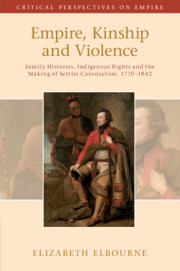 Empire, Kinship and Violence
Empire, Kinship and Violence Book contents
- Empire, Kinship and Violence
- Critical Perspectives on Empire
- Empire, Kinship and Violence
- Copyright page
- Contents
- Figures
- Maps
- Acknowledgements
- A Note on Nomenclature
- Abbreviations
- Introduction
- Part I North America
- Part II Upper Canada, New South Wales, Van Diemen’s Land, Victoria, Western Australia, the Cape Colony, Sierra Leone
- Part III Britain, the Cape Colony, West Africa
- 8 Colonial Sins and Priscilla Buxton’s Quest for Virtue
- 9 Keeping Colonialism in the Family
- Conclusions
- Bibliography
- Index
8 - Colonial Sins and Priscilla Buxton’s Quest for Virtue
from Part III - Britain, the Cape Colony, West Africa
Published online by Cambridge University Press: 15 December 2022
- Empire, Kinship and Violence
- Critical Perspectives on Empire
- Empire, Kinship and Violence
- Copyright page
- Contents
- Figures
- Maps
- Acknowledgements
- A Note on Nomenclature
- Abbreviations
- Introduction
- Part I North America
- Part II Upper Canada, New South Wales, Van Diemen’s Land, Victoria, Western Australia, the Cape Colony, Sierra Leone
- Part III Britain, the Cape Colony, West Africa
- 8 Colonial Sins and Priscilla Buxton’s Quest for Virtue
- 9 Keeping Colonialism in the Family
- Conclusions
- Bibliography
- Index
Summary
By the 1830s, a number of British humanitarians saw empire as a solution to problems. The final section of this book focuses on the Buxtons, a powerful British gentry family whose members turned from the abolition of slavery to the defence of Indigenous peoples in the British settler empire in the late 1830s. This first chapter of two discusses Priscilla Buxton, daughter of leading abolitionist MP Thomas Fowell Buxton and his close collaborator, who sat at the centre of an empire-wide information gathering network. She spent much of her life on international political causes in response to her deep sense of Christian duty even as she also ultimately supported an expedition that would have begun the colonization of what is today Nigeria. The chapter analyses the evidence that Buxton accumulated about police and settler killings on the Eastern Cape frontier and shows how a political case was made, relayed in part through kinship networks. The study also follows the fate of key stories, notably evidence for the killing of Xhosa chief Sigcau and seven of his men by settlers on commando, once they entered the discursive space of a commission of inquiry and were attacked by the supporters of the colonial administration.
Keywords
- Type
- Chapter
- Information
- Empire, Kinship and ViolenceFamily Histories, Indigenous Rights and the Making of Settler Colonialism, 1770-1842, pp. 307 - 347Publisher: Cambridge University PressPrint publication year: 2022
